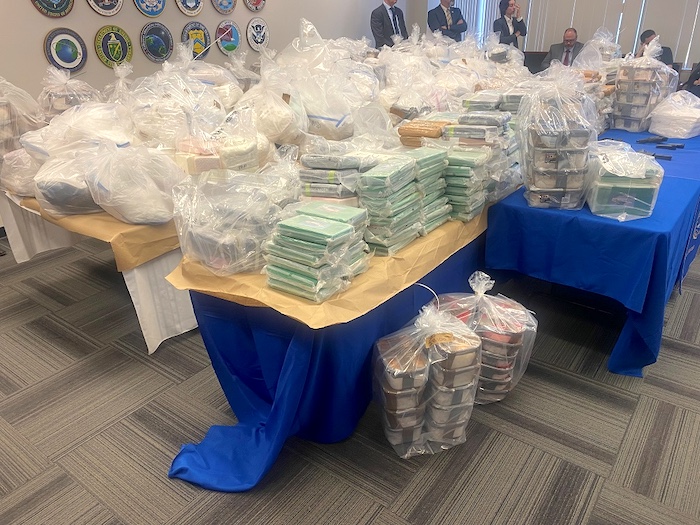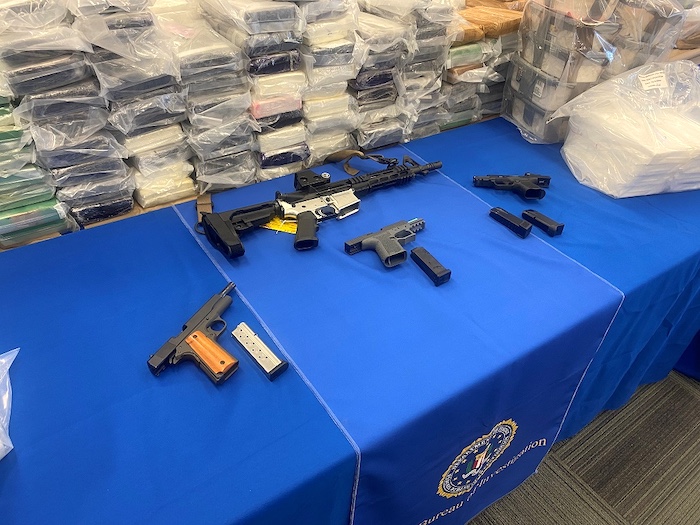
LOS ANGELES – Ten people were arrested in multiple cities over the past day in relation to two federal indictments charging members of an organized crime syndicate who allegedly conspired to traffic and import hundreds of kilograms of cocaine and other controlled substances from Mexico through Los Angeles for export to Canada or re-distribution throughout the United States.
Arrest and search warrants were executed this morning by a coalition of international law enforcement partners in various cities, including Los Angeles; Sacramento, California; Miami; Odessa, Texas; and the Canadian cities of Montreal, Toronto and Calgary.
In addition to those arrested, two defendants were already in state custody, and seven defendants are fugitives, including three Mexicans who allegedly supplied wholesale quantities of narcotics to the traffickers in the United States and Canada.
The investigation, known as “Operation Dead Hand,” resulted in two federal grand jury indictments returned under seal in Los Angeles earlier this month. The indictments, which were unsealed today, collectively charge 19 individuals for their alleged roles in the organized crime syndicate, including Mexico-based suppliers who brought large quantities of narcotics into the United States, United States distributors, a Canadian who led an exportation organization, Canadian-based semi-truck drivers who operate in the United States, and a large-scale Canadian trafficker and Italian organized crime figure, Robert Scoppa, whom investigators allege was purchasing massive quantities of drugs on a wholesale basis.

“Today’s charges and arrests across North America reflect the Justice Department’s close coordination with our Mexican and Canadian partners to disrupt international narcotics trafficking,” said Deputy Attorney General Lisa O. Monaco. “These cases provide yet another example of how our agents and prosecutors work side-by-side to uncover and dismantle organized criminal networks peddling and profiting from deadly drugs.”
“Drug trafficking is a global problem being driven by sophisticated, organized crime groups who put profits over people’s lives,” said United States Attorney Martin Estrada. “Motivated by greed, these criminals destroy lives, devastate families, and wreak havoc in our community. But this case shows that we will collaborate with our international partners to bring these criminal networks to justice. Those who traffic in highly addictive and dangerous drugs will be held accountable.”
“Until today, the organized members of this conspiracy operated with impunity throughout the many thousands of miles that comprise the North American continent, poisoning communities along the way,” said Donald Alway, the Assistant Director in Charge of the FBI’s Los Angeles Field Office. “The strength of this partnership cannot be overstated. The agents and detectives on this case did an outstanding job of pooling resources and worked seamlessly across borders toward a mutual goal of putting this massive drug pipeline out of business.”
Investigators developed information indicating the organized crime group used Canadian “handlers” and “dispatchers” who travelled from Canada to Los Angeles for short amounts of time. The handlers coordinated the pick-up and delivery of large shipments of cocaine and methamphetamine, which were loaded onto long-haul semi-trucks destined for Canada. Wholesale quantities of fentanyl were seized as a result of the investigation. The transportation was coordinated by a network of drivers working with dozens of trucking companies who made numerous border crossings from the United States to Canada via the Detroit Windsor Tunnel, the Buffalo Peace Bridge, and the Blue Water Bridge.

The indictments allege illicit drug trafficking activity cumulatively involving approximately 845 kilograms (1860 pounds) of methamphetamine, 951 kilograms (2,092 pounds) of cocaine, 20 kilograms (44 pounds) of fentanyl and 4 kilograms (nearly 9 pounds) of heroin. Over $900,000 in cash was seized during the investigation. The estimated wholesale value of the narcotics seized was between $16-28 million.
“Today, organized crime knows no boundaries,” said Michel Moore, the Chief of Police of the Los Angeles Police Department. “It is through the international cooperation between LAPD, the FBI, the United States Attorney’s Office for the Central District, the Royal Canadian Mounted Police and others that we were able to apprehend and charge multiple individuals who have imported significant amounts of drugs into this country. I am proud of our continued work with our federal and international partners to bring safety to our respective communities, and reduce the lives lost by these illicit drugs.”
“Organized crime groups continue to bring increasingly toxic drugs into our communities, a trend that has had a devastating impact on many Canadians, and most regrettably, our children and youth,” said Royal Canadian Mountain Police Chief Superintendent, Mathieu Bertrand. “As Canada’s national police force, the RCMP is dedicated to disrupting the flow of illegal drugs into our country, looking beyond our borders to where these threats originate and stopping them at the source. Operation Dead Hand demonstrates the close work we do with our international partners to combat transnational organized crime, helping keep our communities safe on both sides of the border.”
“Customs and Border Protection’s partnerships with international, federal, state and local law enforcement agencies are a key component of our efforts to combat the transnational organized crime threat and prevent the movement of dangerous illicit drugs,” said Cheryl M. Davies, the Director of Field Operations for U.S. Customs and Border Protection’s Los Angeles Field Office. “CBP will continue to invest in these partnerships as we work together to keep dangerous drugs out of our communities.”
U.S. v. Sandoval:
An 18-count indictment returned on January 4 charges 10 defendants for their roles in an organization which allegedly began operating on an unknown date and continued to on or about March 2023. The charges in the indictment allege two drug trafficking conspiracies; conspiracy to import cocaine; drug exportation conspiracy; distribution/possession with intent to distribute controlled substances; possession of a firearm in furtherance of drug trafficking and being a felon in possession of ammunition.
The defendants charged in this indictment are:
- Jesus Ruiz Sandoval Jr., 45, of Guadalajara, Mexico;
- John Joe Soto, 42, of Guadalajara, Mexico;
- Eduardo Carvajal, 50, of Guadalajara, Mexico;
- Roberto Scoppa, 55, of Montreal, Canada;
- Ayush Sharma, 25, of Brampton, Canada;
- Subham Kumar, 29, of Calgary, Canada;
- Carlos Barragan, 51, of Long Beach, California;
- Corell Carbajal Garcia, 38, of Hemet, California;
- Humberto Luis Bermejo, 26, of Odessa, Texas; and
- Esteban Sinhue Mercado, 24, of San Jacinto, California.
Sandoval Jr., who is currently a fugitive, is believed to be a large-scale drug trafficker involved in importing drugs from Mexico into the United States for distribution. John Joe Soto is believed to work under Sandoval. Eduardo Carvajal, also an alleged large-scale drug-trafficker, is believed to export drugs from the United States to Canada. Robert Scoppa is an alleged Canadian drug trafficker with close ties to an Italian organized crime family in Montreal. Barragan is an alleged drug trafficker who lives in the United States. Sharma and Kumar are semi-truck drivers involved in exporting drugs to Canada.
U.S. v. Sidhu:
A 23-count indictment returned on January 3 charges nine defendants for their roles in a related criminal enterprise which allegedly operated from at least September 2020 through February 2023. In addition to a drug trafficking conspiracy, the indictment alleges a drug exportation conspiracy and substantive counts of distribution/possession with intent to distribute controlled substances.
The defendants charged in this indictment are:
- Guramrit Sidhu, 60, of Brampton, Canada;
- Ivan Gravel Gonzalez, 32, a resident of both the Dominican Republic and Montreal, Canada;
- Daniel Antonio Trejo Huerta, 43, of Riverside, California;
- Ignacio Lopez, 53, a resident of Santa Ana, California;
- Daniel Joseph Alan Herrera, 27, of Miami;
- Orlando Velasco Jr., 29, of Stanton, California;
- Angel Larry Sandoval, 32, of Bell Gardens, California;
- Jorge Pina Nicols, 22, of Long Beach, California; and
- Bryan Ureta Valenzuela, 24, of Ontario, California.
Sidhu is alleged to have orchestrated the trafficking and exportation of large-scale quantities of controlled substances to Canada working with several co-defendants described as suppliers. Ivan Gravel Gonzalez is alleged to be part of Sidhu’s exportation team based in the United States. Sidhu, also known as “King,” is charged with one count of engaging in a continuing criminal enterprise. According to the indictment, Sidhu occupied a position of organizer, supervisor and manager, and in this role obtained substantial income and resources.
An indictment is merely an allegation. All defendants are presumed innocent until proven guilty beyond a reasonable doubt in a court of law.
If convicted, each defendant would face maximum penalties ranging from 40 years to life in federal prison. If convicted, Sidhu would face a mandatory minimum penalty of 20 years in prison. If convicted, Sandoval and Carvajal each would face a mandatory minimum penalty of 15 years in prison.
This case is part of an ongoing investigation by international law enforcement partners including the FBI, the Los Angeles Police Department and the Los Angeles Interagency Metropolitan Police Apprehension Crime Task Force (LA IMPACT), the Royal Canadian Mounted Police, U.S. Customs and Border Protection, and law enforcement authorities in Mexico. Significant assistance was provided by Homeland Security Investigations and the Drug Enforcement Administration.
The Justice Department’s Office of International Affairs; the FBI’s Legal Attaché Offices in Mexico City, Ottawa and New Delhi; and the FBI Field Offices in Miami, El Paso and Buffalo provided substantial assistance and support.
Operation Dead Hand is part of an Organized Crime Drug Enforcement Task Forces (OCDETF) investigation. OCDETF identifies, disrupts, and dismantles the highest-level drug traffickers, money launderers, gangs and transnational criminal organizations that threaten the United States by using a prosecutor-led, intelligence-driven, multi-agency approach that leverages the strengths of federal, state and local law enforcement agencies against criminal networks.
Assistant United States Attorney Brittney M. Harris of the International Narcotics, Money Laundering, and Racketeering Section is prosecuting this case.





















